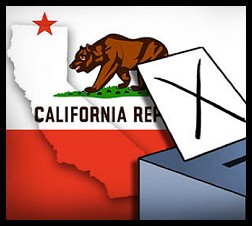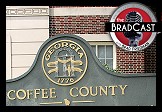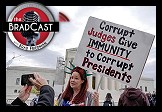 Over the weekend state Assembly Member John Pérez called off his request for a statewide "recount" in the state Controllers primary race, despite the results from the June primary remaining the closest in a statewide race in California history. The vast majority of ballots never received a review by human eyeballs. [See NOTE at bottom of article to explain our use of quotes around the word "recount".]
Over the weekend state Assembly Member John Pérez called off his request for a statewide "recount" in the state Controllers primary race, despite the results from the June primary remaining the closest in a statewide race in California history. The vast majority of ballots never received a review by human eyeballs. [See NOTE at bottom of article to explain our use of quotes around the word "recount".]
A partial hand-count of paper ballots in two different counties --- and calls from fellow Democrats to give up the attempt to assure Election Integrity --- was largely all that would occur before the Pérez campaign decided throw in the towel and toss their support behind fellow Democrat Betty Yee for this November's general election.
"While I strongly believe that completing this process would result in me advancing to the general election," Pérez said in a statement posted to his campaign website, "it is clear that there are significant deficiencies in the process itself which make continuing the recount problematic."
Yee had reportedly defeated Pérez by just 481 votes out of well over 4 million ballots cast --- a margin of approximately 1/100th of one percent --- during the statewide primary on June 3rd, securing second place behind comfortable first-place finisher, Republican Ashley Swearengin, and a coveted spot on the November ballot. California now has a "Top-Two" primary system, where the two highest vote-getters of any party go on to face each other in the general election.
There is no automatic, state-sponsored "recount" for statewide races in CA, no matter how close they are found to be after tabulation by the state's hodge-podge of oft-failed, easily-manipulated computer tabulators in each county. If such a post-election count is desired, a candidate or any voter, may request one and pay for it themselves --- though they are refunded the fees if the results end up changing.
The battle for second place in the primary race, and the right to appear on this November's ballot to become the state's next chief financial officer, resulted in what the Sec. of State's office had described as "uncharted territory".
It left counties scrambling, politicians scratching their heads, media trying to figure out how "recounts" even work in this state, while also revealing a number of tremendous flaws in the state's "recount" statutes, some of which we've attempted to warn about at The BRAD BLOG over recent years...with few in Sacramento bothering to take notice.
They seem to be noticing some of those flaws now, however, even as Perez abruptly ended the count over the weekend, after finding just a handful of votes changing in his favor during expensive, partial hand-counts in two counties.
While the situation revealed serious shortcomings in the state's "recount" statutes, it has also revealed that, at least unless the laws are changed, it may be a great time to steal an election in the Golden State, with very little likelihood of detection...
'Electoral Disaster' in the waiting
According to California's Election Code, post-election counts may be requested for any race, by any voter or candidate. The requester gets to determine which precincts will be counted, whether they will be hand-counted or tallied again by machine, and in which order. That's the good part.
In a statewide contest, counting may go on, one precinct at a time in any number of counties, as desired by the requester, until all ballots in the county are tallied. At any time during the process and up to 24 hours after counting has concluded (either because there are no more ballots in the county to count, or the requester has chosen to stop the tally for any reason) another voter or candidate may also request ballots be counted in the same county, or a different one.
In this way, counts can go on until all of the votes in the state are actually tallied or until nobody wants to count anymore. The strategy of counting one county at a time has been dubbed the "Pinball Strategy", where one county is tallied, followed optionally by another, followed by another, and so on, with 24 hours between each one to decide where and if and who will continue to request a count. In 2011, it was described as a potential "electoral disaster" in the waiting.
The short-lived Pérez/Yee count offered a glimpse of that potential disaster, after Pérez requested a statewide count in his effort to find enough untallied or incorrectly tabulated votes to gain the edge on fellow Democrat Yee. Pérez requested hand-counts in some 15 of the state's 58 counties [PDF]. That count began in his selected precincts in Kern and Imperial counties a little over a week ago, as other counties waited nervously to see if they'd have to suit up for the "recount" themselves.
There is no actual statutory deadline for the process. If a candidate is sworn into office while a post-election count is still ongoing, the person sworn into office will be removed and replaced if the tally concludes and determines that the originally certified results were incorrect.
But that's how it would work in a general election. How that process would work in a primary election, however, where there is a hard deadline to ensure the correct candidates appear on the general election ballot, is anyone's guess, and had made for some nervous lawmakers over the past week of hand-counts in the the Pérez/Yee contest. It led Sec. of State Debra Bowen's spokesperson Shannan Velayas to explain to the San Francisco Chronicle: "This is really uncharted territory."
'As much democracy as you can buy'
Moreover, in order to officially change the results in any one county, all ballots in the county must be "recounted". That brings us to the next concern about the state's provisions which The BRAD BLOG has discussed a number of times over recent years, with few taking notice, and even fewer lawmakers taking action to actually do anything about the glaring concerns.
The cost of "recounts" must be paid by the requester before each day's counting, and prices are almost entirely left up to each county's Registrar of Voters to determine. In the past, that has resulted in huge disparities in "recount" fees charged from county to county, even in the same contest. It has also allowed Registrars to charge seemingly arbitrary and outrageous amounts in some cases and apparently illegal prices in others, effectively shutting down human voter oversight of computer-tabulated public elections in the process.
For example, in February of 2013, we reported exclusively on the effort to hand-count ballots from the Prop 37 GMO labeling initiative. The "recount" requested by proponents was stopped in its tracks by the Fresno County Registrar who demanded $18,000 before a single ballot could be counted there, while informing the citizens seeking the count that they would be required to pay more than $4,000/day to count thereafter. Those costs were far higher than the cost of hand-counts in other counties for the same ballot measure, and seemingly in violation of the law. Nonetheless, as we reported at the time, no action was taken by either law enforcement or the Secretary of State.
In 2012, the former Riverbank Mayor called off her count, after reportedly losing by just 53 votes, when Stanislaus County attempted to charge her $2,000 per hour for a post-election tally. (That amounted to approximately $20 per ballot in her aborted 5-hour count.)
As long ago as 2006, we also reported exclusively on the San Diego County Registrar who was attempting to charge at least $120,000 for the recount of a controversial special election for the U.S. House in California's 50th Congressional District. That cost would have been approximately $1.00 per ballot, versus 14 cents per ballot as charged for another count not long prior in neighboring Orange County.
So without standardized costs for such counts, posted in advance of elections, as we've called for for years, Registrars can make election oversight very difficult for just about anybody they like. Moreover, even when counting is moderately priced, expenses for counting a state the size of California can be enormous and out of reach for even the most well-funded candidates. Los Angeles County alone, the nation's largest voting jurisdiction, with more registered voters than 36 entire states, can cost up to $1 million in fees to count in full.
Without an automatic "recount" rule, paid for by the state, counting entire counties is likely out of reach for even the wealthiest of campaigns, including former state Assembly Speaker John Pérez, whose campaign war chest far out-paced Yee's. And, remember, had Pérez found enough uncounted or incorrectly tallied votes to close the gap against Yee, she then would have had the opportunity to count elsewhere to hopefully flip the results back against him --- if she could have afforded it.
"The recount rules mean you get as much democracy as you can buy," says Loyola Law School's Jessica A. Levinson.
Last month, a Republican Assemblyman, with the help of Democrats in that chamber, almost made things even worse. As The BRAD BLOG reported exclusively at the time, Assembly Member Curt Hagman had authored a bill that would have required citizen-requested counts to be paid for from "the voter's own personal funds". In other words, it would have been illegal to raise funds from other supporters for such a count. Only the wealthiest of individuals could have even thought of requesting a "recount". AB 2369 easily passed out of the Democratic Party-dominated Assembly with an 66 to 7 vote. The provision was only terminated in the state Senate after our exposé resulted in Hagman gutting the absurd provision.
State-sponsored, automatic 'recounts'?
Earlier this month, Richard Tamm, co-chair of the California state Voting Rights Task Force, writing to several progressive groups, called for state lawmakers to pass a bill requiring the state pay for post-election counts "in state-wide races where the winner wins by less than .5%, that the recount be done statewide in all precincts simultaneously, and that the recount be completed within 30 or 60 days."
In her op-ed on Sunday, Levinson cited automatic, state-sponsored counts carried out in some 19 other states when "the margin between two candidates is a statistical tie or within approximately 0.1 percent to 1 percent of the votes cast in that election."
"Automatic recounts of the entire state help to ensure that the candidate with the most votes, not the most money, is successful," she wrote. "A procedure that provides for the counting of only certain votes deprives the public of this assurance."
Both candidates for CA Secretary of State this year, Republican Pete Peterson and Democratic state Senator Alex Padilla, are each now calling for "automatic, statewide recounts in close elections and [to] have the state pick up the bill," according to Chris Megerian at the L.A. Times.
Megerian adds that current, term-limited Sec. of State Debra Bowen "has not spoken publicly about the recount process," though her spokesperson, Shannan Velayas, told The BRAD BLOG via email after Pérez first requested his count, that Bowen does not support automatic "recounts".
"Recounting all of the ballots in all 58 counties is both time consuming and expensive," Velayas told us. She says Bowen prefers "risk-limiting audits" for all elections, theoretically precluding the need for "recounts".
"The audit model begins with a small sample and gradually escalates --- potentially to a full hand count --- if significant differences persist between the machine and manual tally results," she explained. "The sample size is adjustable."
"The Secretary of State believes the statistical audits are the preferred method because they are more efficient and cost-effective," Velayas said, citing a similar program which ran as a federally-funded pilot program in California from 2011 to 2013.
Democratic Assemblyman Kevin Mullin, earlier in the month, announced that he was "researching ways to ensure the recount process in future statewide elections is fair to all candidates" and that he planned to introduce a bill for reform after the Legislature returns from its summer recess, according to Political Blotter's Josh Richman. He reports that options for reform "might include setting a threshold that automatically triggers the recount process for very close races, the development of a recount standard across counties, and a state-funded recount process."
"It's imperative to our system of governance that the election process is fair and transparent for all voters and candidates," Mullin said in a press release. "We are actively researching a variety of options and engaging in discussions with the Secretary of State's office so we can craft comprehensive legislation on this issue. When the recount process is necessary, it should be easily implemented and every vote valued and counted equally," he said.
'Every vote deserves to be counted'
The cost to a candidate or ballot initiative support to count the entire state, however, is pegged at about $5 million, according to Dr. John Maa, a San Francisco physician who financed California's very first statewide "recount" --- or, partial "recount" as it turned out --- for Prop 29, a tobacco tax measure that reportedly failed in 2012. He's become an active Election Integrity advocate ever since, even as an active supporter of state Democrats.
Maa tells The BRAD BLOG that counting L.A. County alone would cost approximately $1 million. "It cost me around $125,000 to recount one tenth of LA in the Prop 29 contest," he says.
"The existing recount laws are indeed a deterrent to election integrity," he told us. "The state is not fulfilling it's duty and they make the recount requester look like the bad person."
Maa, who says he was in close contact with the Pérez team before and during the partial count, says the candidate simply couldn't afford to keep counting. "There was no way to finance it."
He points out that the estimated costs of a statewide contest are just the tip of the iceberg. "You also have to pay for legal services, hotels, airfare, meals, people to staff the recount, communications and strategy, IT support etc." He went on to opine that "the burden to preserve election integrity falls on the candidate or ballot measure supporter."
Few votes were ultimately found to have been uncounted or incorrectly tallied during the aborted partial Controller's race "recounts" in Kern and Imperial, but the process in a race that close can be like looking for a needle in a California-sized haystack. With Pérez concession, Yee will now go on to represent the Democratic Party on the November ballot, whether she was really the voters' preferred candidate or not.
"I began this process because every vote deserves to be counted fairly and accurately, and as the recount has made clear, California needs to rethink our approach and incorporate best practices from across the nation," Pérez explained in his posted statement. "This effort was not about the outcome of a particular election, but the integrity of every election, and the issues brought to the light over the last two weeks need to be addressed in a comprehensive and thoughtful manner."
Machines win, voters lose. Again.
Neither candidates nor voters seeking to assure that computers tallies are accurate should have to best guess it and spend piles of their own money simply to ensure the actual candidates preferred by the voters were the ones announced as the "winners" by the unverified computer tabulators.
The takeaway from this entire fine mess is, once again, that the machines win and voters lose. Remember how folks always love to say that paper ballots are important, because in the event of a close election, they can be checked to make sure the results were reported correctly by the computer scanners? Well, even in California, where most of the state votes on paper ballots, if they are never actually counted by any human being to assure accuracy --- even in the closest of races --- what good are those paper ballots?
Over the years, some have said that in order to steal an election successfully with an electronic system, the thief just has to make sure the margin is big enough that nobody would bother to check it. Well, the disturbing news revealed this week in California is that you don't even have to have a large margin for folks to not bother --- or not to be able to afford to bother --- to check the results for accuracy.
It seems a perfect time to use a computer to steal an election right now in the Golden State. After all, who could afford to find out if you did?
* NOTE: The BRAD BLOG generally uses quotes around the word "recount" to denote post-election hand-counts of ballots which have never actually been counted by human beings, but rather, only tabulated by computers during the official tally. It's impossible to know whether those computers actually tallied votes accurately unless paper ballots are examined by hand.
|
|
|
|
|
(Snail mail support to "Brad Friedman, 7095 Hollywood Blvd., #594 Los Angeles, CA 90028" always welcome too!)
|


 'Green News Report' 5/14/24
'Green News Report' 5/14/24
 Recount in Tied U.S. House Primary Highlights Probs in CA Law: 'BradCast' 5/13/24
Recount in Tied U.S. House Primary Highlights Probs in CA Law: 'BradCast' 5/13/24 Sunday 'Stormy Weather Continues' Toons
Sunday 'Stormy Weather Continues' Toons Facing Down the Threat to American Democracy: 'BradCast' 5/9/24
Facing Down the Threat to American Democracy: 'BradCast' 5/9/24 'Green News Report' 5/9/24
'Green News Report' 5/9/24 Trump Trial Ketchup:
Trump Trial Ketchup: New Cybersecurity Breach in Coffee County, GA: 'BradCast' 5/7/24
New Cybersecurity Breach in Coffee County, GA: 'BradCast' 5/7/24 'Green News Report' 5/7/24
'Green News Report' 5/7/24 2024 Electoral -- and Climate -- Omens: 'BradCast' 5/6/24
2024 Electoral -- and Climate -- Omens: 'BradCast' 5/6/24 Sunday 'Self Reflecting' Toons
Sunday 'Self Reflecting' Toons 'Green News Report' 5/2/24
'Green News Report' 5/2/24 Pro-Palestine Protests, Proportionality, and Political Perspective: 'BradCast' 5/2/24
Pro-Palestine Protests, Proportionality, and Political Perspective: 'BradCast' 5/2/24  Trump Trial Ketchup: Criminal Contempt and His Two-Tier Justice: 'BradCast' 5/1/24
Trump Trial Ketchup: Criminal Contempt and His Two-Tier Justice: 'BradCast' 5/1/24 CANNING: Third-Party Myopia v.
CANNING: Third-Party Myopia v. A Few Hits of Dopamine for Your Listening Pleasure: 'BradCast' 4/30/24
A Few Hits of Dopamine for Your Listening Pleasure: 'BradCast' 4/30/24 SCOTUS Corruption on Full Display at Trump 'Immunity' Hearing: 'BradCast' 4/29/24
SCOTUS Corruption on Full Display at Trump 'Immunity' Hearing: 'BradCast' 4/29/24 Trump's Ridiculous 'Immunity' Case Heard by Corrupted SCOTUS: 'BradCast' 4/25/24
Trump's Ridiculous 'Immunity' Case Heard by Corrupted SCOTUS: 'BradCast' 4/25/24 NY Trump Trial Mid-Week Ketchup: 'BradCast' 4/24/24
NY Trump Trial Mid-Week Ketchup: 'BradCast' 4/24/24 'Election Fraud, Pure and Simple': 'BradCast' 4/23/24
'Election Fraud, Pure and Simple': 'BradCast' 4/23/24
 VA GOP VOTER REG FRAUDSTER OFF HOOK
VA GOP VOTER REG FRAUDSTER OFF HOOK Criminal GOP Voter Registration Fraud Probe Expanding in VA
Criminal GOP Voter Registration Fraud Probe Expanding in VA DOJ PROBE SOUGHT AFTER VA ARREST
DOJ PROBE SOUGHT AFTER VA ARREST Arrest in VA: GOP Voter Reg Scandal Widens
Arrest in VA: GOP Voter Reg Scandal Widens ALL TOGETHER: ROVE, SPROUL, KOCHS, RNC
ALL TOGETHER: ROVE, SPROUL, KOCHS, RNC LATimes: RNC's 'Fired' Sproul Working for Repubs in 'as Many as 30 States'
LATimes: RNC's 'Fired' Sproul Working for Repubs in 'as Many as 30 States' 'Fired' Sproul Group 'Cloned', Still Working for Republicans in At Least 10 States
'Fired' Sproul Group 'Cloned', Still Working for Republicans in At Least 10 States FINALLY: FOX ON GOP REG FRAUD SCANDAL
FINALLY: FOX ON GOP REG FRAUD SCANDAL COLORADO FOLLOWS FLORIDA WITH GOP CRIMINAL INVESTIGATION
COLORADO FOLLOWS FLORIDA WITH GOP CRIMINAL INVESTIGATION CRIMINAL PROBE LAUNCHED INTO GOP VOTER REGISTRATION FRAUD SCANDAL IN FL
CRIMINAL PROBE LAUNCHED INTO GOP VOTER REGISTRATION FRAUD SCANDAL IN FL Brad Breaks PA Photo ID & GOP Registration Fraud Scandal News on Hartmann TV
Brad Breaks PA Photo ID & GOP Registration Fraud Scandal News on Hartmann TV  CAUGHT ON TAPE: COORDINATED NATIONWIDE GOP VOTER REG SCAM
CAUGHT ON TAPE: COORDINATED NATIONWIDE GOP VOTER REG SCAM CRIMINAL ELECTION FRAUD COMPLAINT FILED AGAINST GOP 'FRAUD' FIRM
CRIMINAL ELECTION FRAUD COMPLAINT FILED AGAINST GOP 'FRAUD' FIRM RICK SCOTT GETS ROLLED IN GOP REGISTRATION FRAUD SCANDAL
RICK SCOTT GETS ROLLED IN GOP REGISTRATION FRAUD SCANDAL VIDEO: Brad Breaks GOP Reg Fraud Scandal on Hartmann TV
VIDEO: Brad Breaks GOP Reg Fraud Scandal on Hartmann TV RNC FIRES NATIONAL VOTER REGISTRATION FIRM FOR FRAUD
RNC FIRES NATIONAL VOTER REGISTRATION FIRM FOR FRAUD EXCLUSIVE: Intvw w/ FL Official Who First Discovered GOP Reg Fraud
EXCLUSIVE: Intvw w/ FL Official Who First Discovered GOP Reg Fraud GOP REGISTRATION FRAUD FOUND IN FL
GOP REGISTRATION FRAUD FOUND IN FL


































